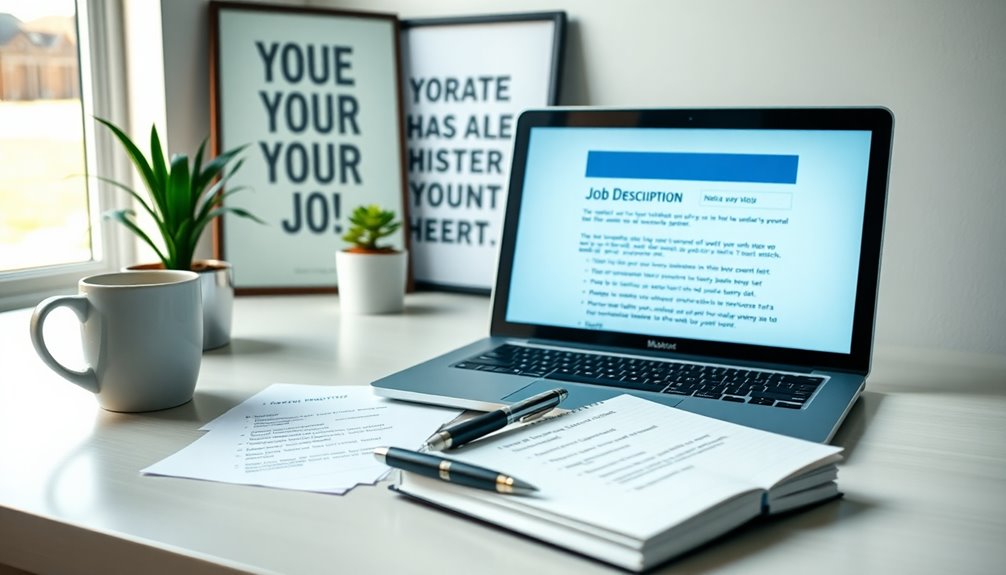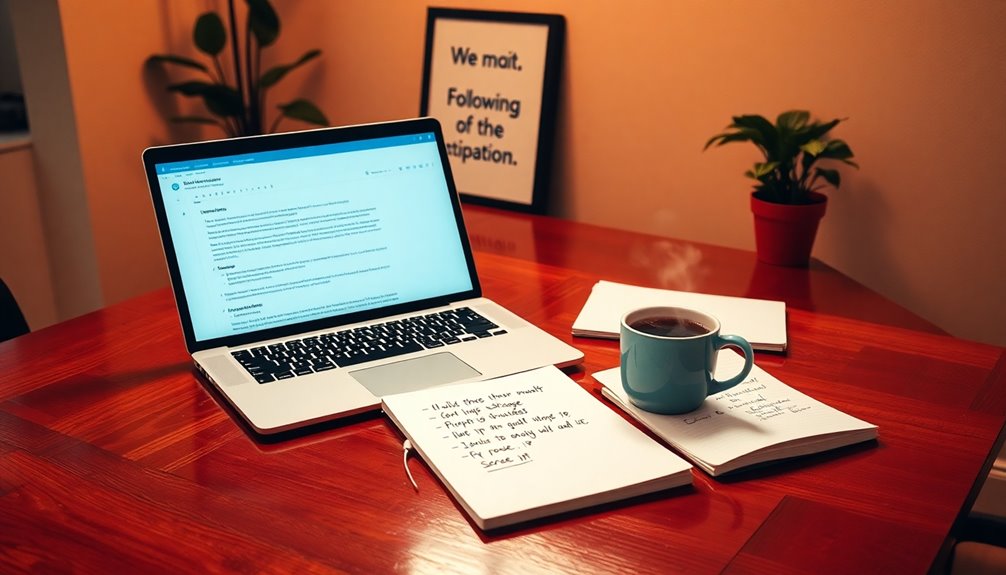To ace your job interview, start by thoroughly researching the company and reviewing the job description to tailor your responses. Practice common interview questions, focusing on your key skills and experiences. Dress appropriately according to the company culture and engage in mock interviews to boost your confidence. Arrive 10-15 minutes early to make a great first impression through professionalism and punctuality. Don't forget to send a follow-up message to express your gratitude and reiterate your interest. Each of these strategies can enhance your chances of success, and there's more to discover that can elevate your preparation even further.
Key Takeaways
- Conduct thorough research on the company and role to align your skills with their expectations and culture.
- Practice common interview questions and conduct mock interviews to build confidence and refine your responses.
- Dress appropriately for the company's dress code to make a positive first impression.
- Arrive 10-15 minutes early to demonstrate punctuality and professionalism, allowing time for mental preparation.
- Follow up with a concise thank-you note post-interview to reinforce your interest and appreciate the opportunity.
Research the Company

Researching a company's mission, values, and culture is essential for acing your job interview. Start by diving into their mission statement to grasp what drives the organization. This insight will help you align your answers with their motivations during the interview. Next, familiarize yourself with the company's core values; understanding these will allow you to demonstrate how your personal ethics match their workplace environment.
Take a closer look at the company's culture through their website, social media, and employee reviews. Understanding the work environment will help you assess if it fits your career goals. Don't forget to highlight any recent achievements the company has made; being aware of these details shows your genuine interest and helps you discuss how you can contribute to their ongoing success. Moreover, thorough research can significantly enhance the quality of your responses and set you apart from other candidates. Additionally, being aware of the company's financial health can provide insight into its stability and growth potential, which can be a key topic during discussions.
Finally, get a feel for the day-to-day operations by researching employee experiences. Knowing how the team collaborates and what challenges they face enables you to tailor your responses effectively. By thoroughly researching the company, you'll present yourself as a knowledgeable candidate who's ready to make a meaningful impact.
Review the Job Description

Once you've gathered insights about the company, it's time to turn your focus to the job description. Carefully examine it to align your qualifications with what the employer is looking for. Identify the key skills, experiences, and qualities they desire in an ideal candidate. Pay attention to specific keywords, as these will guide your responses during the interview.
Review the responsibilities and daily tasks associated with the role. This understanding will help you prepare thoughtful questions that demonstrate your interest in the position. Create mock interview questions based on the job description, and develop relevant examples that showcase your skills and experiences.
Think about how your qualifications align with the requirements outlined in the job description. Preparing targeted questions about role expectations will further demonstrate your thorough understanding of the position. Prepare to explain why you're a good fit, emphasizing your background and achievements. If you notice any unclear aspects in the job description, formulate questions to clarify during the interview. This not only shows your engagement but also guarantees you have a thorough understanding of the role you're applying for. By mastering the job description, you'll present yourself as a well-prepared and suitable candidate.
Practice Common Interview Questions

Acing an interview often hinges on your ability to confidently answer common interview questions. To prepare effectively, start by identifying frequently asked questions that span behavioral, situational, and standard formats. Here are a few key areas to focus on:
- Strengths and Weaknesses: Be ready to discuss your strengths and how they align with the position, as well as areas for growth. Demonstrating self-awareness and growth through your discussion of weaknesses can significantly impress hiring managers.
- Career Goals: Prepare to articulate your short-term and long-term career aspirations, ensuring they connect with the company's direction.
- Company-Specific Interests: Research the company's mission and values, and be prepared to explain why you're interested in working there.
- Curveball Questions: Anticipate unexpected questions that may test your problem-solving abilities or adaptability.
Don't just think about these questions—practice your answers. Develop concise, relevant responses that highlight your skills and experiences. Use specific examples to back up your claims, and rehearse speaking them aloud. Recording yourself can help you identify areas for improvement, and getting feedback from friends or mentors can enhance your preparation. Practicing in a mock interview setting can also boost your confidence and readiness.
Use the STAR Method

To effectively answer behavioral questions in an interview, you should use the STAR method. This framework helps you craft relevant examples by clearly outlining the Situation, Task, Action, and Result of your experiences. Practicing your delivery will guarantee you communicate your stories confidently and effectively during the interview. The STAR method is particularly valuable because it allows you to focus on past experiences to illustrate your competencies.
Define STAR Framework
The STAR framework is a powerful tool for structuring your responses in a job interview, helping you convey your experiences effectively. It stands for Situation, Task, Action, and Result, and using it can make your answers more impactful. Here's how you can break it down:
- Situation: Start by describing the specific context or scenario where the experience took place. Provide enough detail to help the interviewer visualize the setting.
- Task: Clearly explain the goal or objective you needed to accomplish. Clarify the significance of the challenge and why it mattered.
- Action: Focus on the specific actions you took to address the situation. Use "I" to emphasize your individual contributions, detailing the steps you followed and any challenges you overcame.
- Result: Finally, describe the outcome of your actions. Highlight positive results, achievements, and what you learned from the experience. Make sure the impact of your actions is clear and compelling. An effective way to demonstrate your growth is by sharing how you improved your GPA through structured study habits.
Craft Relevant Examples
Crafting relevant examples using the STAR method can considerably enhance your interview responses. Start by identifying specific situations from your past that showcase your skills and behaviors, ensuring they relate to the job at hand. The "Situation" part should provide enough context for the interviewer to grasp the scenario, whether from work, academic projects, or volunteer experiences. Keep it brief, focusing on essential details.
Next, clarify the "Task" you were responsible for in that situation. Highlight your role and the goal you aimed to achieve, keeping this section concise as well. Remember, demonstrating emotional intelligence in your examples can help convey your maturity and suitability for the role.
Prepare several STAR examples by recalling recent experiences that demonstrate your abilities in teamwork, leadership, or problem-solving. Each example should have a clear beginning, middle, and end. When sharing your stories, be honest and specific—avoid generalizing multiple events. Additionally, practicing your responses can help you feel more comfortable and confident during the interview.
Lastly, tailor your examples to match the job requirements outlined in the description. Choose situations that emphasize the skills the employer values, and remember to highlight your personal contributions. This strategic approach will make your responses compelling and relevant.
Practice Delivery Techniques
When preparing to deliver your STAR responses, practice is key to guaranteeing you communicate your experiences effectively. By honing your delivery, you can make a strong impression during your interview. Here are four strategies to enhance your practice:
- Recall Recent Situations: Think of examples that showcase your skills and align with the job requirements. This guarantees relevance and demonstrates your capability.
- Prepare Short Descriptions: Have concise summaries of each STAR response ready. This helps you convey essential information without getting bogged down.
- Be Detailed but Concise: While you want to provide enough detail for clarity, avoid rambling. Focus on the highlights, guaranteeing your answer has a clear beginning, middle, and end. Mastering the STAR method can significantly improve the effectiveness of your storytelling during interviews.
- Practice Delivery: Rehearse your responses aloud. This helps you sound natural and confident, rather than overly rehearsed.
Dress Appropriately

Dressing appropriately for a job interview is essential in making a positive first impression. Start by researching the company's culture through their website and social media. Identify if the environment is corporate, business casual, or creative, and adjust your attire accordingly. For corporate settings, a classic suit in navy, black, or grey works best. In business casual environments, consider pairing a blazer with dress pants and a button-up shirt, or a professional dress for women. If you're interviewing at a creative or tech company, opt for smart-casual attire like chinos and a nice shirt.
Fit matters—ensure your clothes fit well to avoid distractions and boost your confidence. Steer clear of flashy pieces, large logos, and excessive jewelry. Choose clean, polished conservative dress shoes, and match the color of your jacket with your slacks or skirt. Pay attention to grooming; a well-groomed appearance showcases professionalism. Proper grooming indicates seriousness about the opportunity, so for women, stockings can add polish, while men should keep ties simple and centered. By aligning your outfit with the company's values, you'll project the right image and set yourself up for success.
Arrive Early

Arriving early to your interview isn't just about being on time; it shows you're reliable and keen on the opportunity. Planning your route ahead of time helps you avoid any unexpected delays, ensuring you walk in with confidence. Plus, a little extra time allows you to gather your thoughts and relax before the big moment. Arriving 15 minutes early also gives you the chance to review your resume and mentally prepare for the interview.
Benefits of Punctuality
Punctuality can greatly enhance your chances of making a strong impression during a job interview. Arriving early showcases your professionalism and respect for the interviewer's time. Here are some key benefits of being punctual:
- Positive Impression: Arriving on time creates a favorable first impression on the company staff, and they may share your behavior with the hiring manager. Additionally, being punctual reflects well on your overall character and work ethic.
- Reduced Anxiety: Getting there early allows you to relax, calm your nerves, and mentally prepare for the interview, reducing pre-interview stress.
- Ensured Readiness: You'll have time to check in, use the restroom, and review your notes, ensuring you're fully prepared when the interviewer is ready.
- Respectful Tone: Early arrival sets a respectful tone for the entire interview process, influencing the hiring manager's opinion even before the conversation begins.
Planning Your Route
To guarantee a smooth and stress-free journey to your job interview, it's crucial to plan your route carefully. Start by researching the interview location. Use online maps or GPS to pinpoint the exact address and directions. Look out for potential traffic hotspots or construction areas that could cause delays. Identify nearby landmarks and public transportation stops to help orient yourself.
Next, calculate your commute time based on your chosen mode of transportation. If your interview is during peak hours, factor in extra time for high traffic. Don't forget to include time for parking and walking to the location. If you're using public transport, check schedules to ensure you arrive on time.
Prepare for logistics by identifying parking options and understanding any security protocols at the building. Know where the visitor entrance is and whether you need to complete any paperwork beforehand. Bringing a photo ID is also a good idea. Early arrival can also provide an opportunity to observe workplace culture and dynamics.
Finally, conduct a practice run to the interview location. Use the same mode of transportation you'll take on the day, and familiarize yourself with the area, so you're ready to make a great first impression.
Maintain Professional Body Language

Your body language speaks volumes during a job interview, often conveying more than your words ever could. To make a great impression, focus on maintaining professional body language that reflects your confidence and engagement.
- Posture: Sit upright with your shoulders back and spine straight. Avoid slouching, as this can make you appear disinterested. Lean slightly forward to show genuine interest when listening or responding. Positive body language can enhance your overall impression during the interview.
- Eye Contact: Maintain eye contact for about two to four seconds. Address the person asking questions and engage with everyone present. In video interviews, look directly at the camera to keep the connection strong.
- Hand and Body Movements: Keep your arms relaxed at your sides or resting lightly on the table. Avoid excessive fidgeting, as it can signal nervousness. Use hand gestures purposefully to emphasize key points.
- Mirroring: Adapt to the interviewer's nonverbal cues. Subtly mirror their posture and speech patterns to build rapport, but avoid mimicking them. This shows you're in sync and can fit into the company's culture.
Follow Proper Etiquette

To make a great impression, you need to follow proper etiquette during your interview. This means dressing appropriately, arriving early and prepared, and maintaining professional body language throughout the conversation. These small details can set you apart and show the interviewer that you're serious about the opportunity. Additionally, arriving 10-15 minutes early demonstrates your commitment and respect for the interviewer's time.
Dress Appropriately for Interview
Choosing the right attire for a job interview is essential in making a strong first impression. Dressing appropriately not only reflects your professionalism but also shows your understanding of the company's culture. Here are some key points to take into account:
- Understand the Company Culture: Research the company's dress code through its website or social media. Align your attire with their culture—whether it's corporate, business casual, or creative.
- Choose Appropriate Attire: For corporate environments, stick to classic suits in navy, black, or grey. In business casual settings, opt for blazers and tailored pants. Creative firms often welcome smart-casual outfits. Additionally, wearing attire that matches the company dress code can help you blend in and feel more confident.
- Confirm Proper Fit and Comfort: Your clothes should fit well and be comfortable. Avoid anything too tight or loose, and opt for breathable fabrics. Clean, pressed clothes add to your polished look.
- Pay Attention to Grooming and Details: Grooming matters! Keep your look simple and professional. Avoid excessive accessories and confirm your shoes are clean and polished.
Maintain Professional Body Language
Maintaining professional body language during a job interview can greatly influence the impression you leave on the interviewer. Start by making strong eye contact when you enter the room and throughout the conversation. This shows confidence and attentiveness, but remember to avoid intense staring. A warm smile can help convey approachability, so use it wisely alongside positive facial expressions to indicate engagement.
Sit upright with your shoulders relaxed and spine straight to project professionalism. Avoid slouching, as it may signal disinterest. Leaning slightly forward when listening can demonstrate your interest in what's being said. Keep your arms relaxed at your sides or resting on the table to prevent creating barriers. Positive body language enhances perceived confidence and trust, making it essential to your overall presentation.
When greeting the interviewer, offer a firm handshake accompanied by eye contact and a smile. Use head nods to show understanding, but don't overdo it. Hand gestures can enhance your communication, so use them sparingly to emphasize key points. Finally, practice active listening by leaning in slightly, nodding when appropriate, and avoiding distractions like checking your watch. This way, you'll show that you're fully engaged in the conversation.
Arrive Early and Prepared
Leaving a strong impression begins long before the interview starts. Arriving early and prepared shows your commitment and professionalism. Aim to get there 10-15 minutes ahead of schedule to account for any potential delays. This extra time allows you to settle your nerves and gather your thoughts before stepping into the interview room.
Here are four key steps to guarantee you're ready:
- Arrive Early: Plan to be exactly 10 minutes early. This shows respect for the interviewer's time without seeming overly enthusiastic.
- Prepare Necessary Documents: Bring multiple copies of your resume, reference letters, and any requested materials, all neatly organized and easily accessible.
- Follow Proper Etiquette: Turn off your phone, greet everyone with a firm handshake, and maintain a polite demeanor. Remember, you're being observed by all staff. Positive body language will help create a favorable impression.
- Demonstrate Readiness: Research the company and role, and prepare questions to ask. Show enthusiasm and confidence when discussing your qualifications.
Prepare Insightful Questions

Preparing insightful questions for your job interview is essential to making a strong impression. It shows you're not only interested but also engaged with the company. Start by researching the company's mission, values, and culture. This will help you craft relevant questions that reflect your understanding of their goals. Look into recent news and projects to inquire about current developments, demonstrating you're informed and proactive.
Consider asking about the company's values and how they shape the workplace, or how they adapt to industry trends. This reveals your interest in the company's long-term vision. Additionally, being knowledgeable about competitors and industry trends can provide context for your questions, showcasing your comprehensive understanding of the market landscape.
When it comes to the role itself, ask about a typical day to grasp responsibilities and expectations. Inquire about challenges you might face and how to navigate them. Discuss the types of projects you'll work on and how they align with company goals, as well as the metrics for success in your position.
Don't forget about the team dynamics; ask about the management style and collaboration within the team. These questions not only highlight your enthusiasm but also help you assess if this is the right fit for you.
Show Enthusiasm for the Role

While you might feel nervous before your interview, showing enthusiasm for the role can greatly impact your chances of success. Employers want to see that you're genuinely interested in the position and the company. Here are some effective ways to demonstrate your enthusiasm:
- Engage Actively: Listen carefully to the interviewer and respond thoughtfully. Show that you're not just reciting rehearsed answers but are truly interested in the conversation.
- Use Positive Body Language: Keep your posture straight, maintain eye contact, and smile. Lean slightly forward to express your interest and avoid crossing your arms, which can signal discomfort.
- Do Your Homework: Research the company's mission, culture, and recent initiatives. Share your insights during the interview to show that you're informed and invested.
- Maintain a Positive Attitude: Focus on what excites you about the role, avoiding negative comparisons to past jobs. Use confident language and speak passionately about your motivations.
- Recognize the importance of emotional intelligence in building strong connections, as it can help you relate better to your potential employer and show that you are a team player.
Highlight Relevant Experience

To stand out in a job interview, it is crucial to highlight your relevant experience effectively. Start by reviewing the job description to pinpoint key skills and responsibilities. Tie your past work experiences directly to these requirements, using specific examples that demonstrate your fit for the role. Be sure to incorporate keywords from the job listing to make your experiences resonate with the interviewer. Engaging in two-way communication by asking insightful questions can also showcase your confidence and understanding of the role. Additionally, demonstrating strong communication skills can enhance clarity and build rapport with the interviewer.
| Experience Type | Example |
|---|---|
| Accomplishments | "Increased sales by 30% in one year through targeted marketing." |
| Transferable Skills | "Developed strong project management skills while leading a team." |
| Problem-Solving | "Solved a major production issue that saved the company $50,000." |
| Career Goals | "This role aligns perfectly with my ambition to lead innovative projects." |
| Continuous Growth | "Completed a certification in data analysis to enhance my capabilities." |
Focus on Key Skills

Key skills can make or break your performance in a job interview. To effectively showcase your qualifications, you need to focus on the specific skills that align with the job requirements. Here's how you can do that:
- Research the Job Requirements: Carefully review the job description to identify the key skills and responsibilities. Understanding what the employer values sets the stage for your responses.
- Demonstrate Communication Skills: Practice clear and confident speaking. Avoid jargon and filler words. Tailor your communication style to match the interviewer's tone for a more engaging conversation. Effective communication under stress reflects job performance potential.
- Showcase Soft Skills: Punctuality, organization, and enthusiasm are vital. Use specific examples to illustrate your teamwork and collaboration abilities, showing that you're a fit for the company culture.
- Utilize the STAR Method: When answering behavioral questions, structure your responses using the STAR method. This helps you clearly outline your situation, task, actions, and results, making your answers concise and impactful.
Conduct Mock Interviews

Mock interviews are an invaluable tool for honing your interview skills and building confidence. To get the most out of your mock interview, start by selecting a professional setting that mirrors a real interview environment. Choose someone with interview experience—a career specialist or a knowledgeable friend—as your mock interviewer. Arrive early to show punctuality and mentally prepare yourself for the session.
Bring along necessary items, like copies of your resume and relevant documents, and dress smartly to practice your interview attire. Prepare answers to common interview questions tailored to your desired job level and industry. This includes discussing your educational background and how your skills align with the job requirements.
Incorporate behavior-based questions and practice using the STAR method to structure your responses. Share stories that highlight your problem-solving skills and accomplishments. After the mock interview, debrief with your interviewer to receive constructive feedback. Focus on first impressions, body language, and any nervous habits that may need addressing. This will help you refine your approach and boost your confidence before the real interview. Additionally, participating in mock interviews can significantly enhance overall interview performance and readiness, providing you with a realistic practice environment.
Send a Follow-Up

Following up after your interview is essential in reinforcing your interest and making a lasting impression. Crafting a thoughtful thank-you note and timing your follow-up correctly can set you apart from other candidates. A follow-up call typically occurs when a candidate contacts an employer post-interview to inquire about the application status and is usually made after the timeframe given by the interviewer. Let's explore why these steps are so important and how to execute them effectively.
Importance of Following Up
A timely follow-up after your job interview can greatly impact the hiring manager's perception of you. It shows professionalism and reinforces your interest in the position. Here are four key strategies to take into account when following up:
- Timing: Wait about 10 days before reaching out, especially if the interviewer mentioned they'd be in touch soon. Give them time to process applications and conduct interviews.
- Content: Clearly introduce yourself, mention the job title, and the date of your interview. Express your continued interest and thank them for their time. Additionally, emphasizing your authenticity and transparency can help build trust and rapport with the hiring team.
- Clarity: Keep your message professional and concise. Politely inquire about the timeline for their decision or the next steps. Avoid unnecessary small talk.
- Adding Value: If you can, share relevant accomplishments or articles that tie to your conversation. This shows how you can contribute even before being hired.
Crafting a Thank-You Note
Keep your writing concise, ideally one to two paragraphs. Close with a professional tone, encouraging the hiring manager to contact you for a follow-up. Don't forget to include your contact information. Finally, proofread for any errors before sending your note promptly! Remember, a thank-you note not only shows appreciation but also reinforces your interest in the position.
Timing Your Follow-Up
Timing your follow-up is essential for maintaining a positive impression after a job interview. A well-timed follow-up can reinforce your excitement and professionalism. Here are some key points to reflect upon when deciding when to reach out:
- Same Day: While sending a follow-up email on the same day can show excitement, be cautious. It could come off as too enthusiastic if not executed properly.
- 24-48 Hours: This timeframe is the sweet spot. It allows you to reflect and craft a thoughtful message while respecting the interviewer's time, thus demonstrating genuine interest in the role. Additionally, remember that background checks are often conducted during the hiring process, so your follow-up can also reaffirm your qualifications.
- 1 Week Later: If the interviewer specified a timeline for decisions, this is a good time to check in as a gentle reminder.
- Respecting Given Timelines: If a timeline was provided, wait until that period has passed before following up.
Avoid common pitfalls like being pushy or vague in your messaging. Be specific about points discussed in the interview to show your engagement. Maintain a professional tone while expressing excitement, and remember to stay patient—good things take time!
Reflect on the Interview Process

Reflecting on the interview process can provide valuable insights that help you grow and prepare for future opportunities. Take time to analyze every aspect of your experience, from the emotions you felt to the overall interaction with your interviewers. Here's a simple table to help guide your reflection:
| Aspect | Reflection Questions |
|---|---|
| Key Participants | Who were the interviewers, and what were their roles? |
| Setting | Was the interview in-person or virtual? How did it affect your performance? |
| Key Questions | What were the main questions asked, and how did you respond? |
| Significant Moments | What standout moments occurred, and how did you handle them? |
Consider your emotions before, during, and after the interview. Did you feel nervous or confident? Evaluate your performance and compare your expectations to the actual experience. Identifying your emotional responses can significantly enhance your understanding of your strengths and weaknesses, and think about how you can improve for next time. Understanding these elements will allow you to create a solid action plan and apply your insights to future interviews, ultimately enhancing your chances of success.
Frequently Asked Questions
What Should I Do if I Don't Know the Answer to a Question?
If you don't know the answer to a question, it's okay to admit it. Take a moment to gather your thoughts, and don't hesitate to say something like, "I'm not sure about that." This shows honesty and a growth mindset. You can ask clarifying questions to get more context or share your willingness to learn more later. Remember, it's better to be genuine than to make up an answer.
How Can I Manage Interview Anxiety on the Day of the Interview?
To manage interview anxiety on the day of the interview, focus on deep breathing exercises to calm your nerves. Take a moment to practice progressive muscle relaxation, tensing and relaxing different muscle groups. Remind yourself of your past successes and visualize a positive outcome. Engage in light conversation with the interviewer to break the ice. Finally, maintain open body language and smile to project confidence, helping you feel more at ease.
Is It Appropriate to Discuss Salary Expectations During the Interview?
Discussing salary expectations during the interview is like opening a treasure chest of opportunity. You're not just talking numbers; you're aligning your value with the employer's budget. It shows you've done your homework and understand your worth. Make certain to share a well-researched salary range and express flexibility. This conversation isn't just about cash; it's a chance to explore the full compensation package and guarantee you're both on the same page!
What Should I Do if the Interviewer Seems Disinterested?
If the interviewer seems disinterested, don't take it personally. Stay calm and composed, and focus on delivering your answers clearly. Try to engage them by asking thoughtful questions that relate to the role or company. Use the STAR method to structure your responses and illustrate your points with relevant examples. Show your enthusiasm for the position, and maintain professionalism throughout the conversation, regardless of the interviewer's demeanor.
How Can I Assess if the Company Is a Good Fit for Me?
Evaluating if a company's a good fit for you is like finding the right puzzle piece; it should naturally connect. Start by researching the company's values, mission, and culture, confirming they align with yours. Review employee testimonials and inquire about work-life balance. Immerse yourself in the job description and ask about daily tasks and team dynamics. Finally, discuss growth opportunities to guarantee your career aspirations can flourish within the organization.
Conclusion
By applying these 15 proven strategies, you'll boost your chances of acing that job interview. Did you know that 47% of employers say they know within the first five minutes if a candidate is a good fit? That's why preparation is key! When you walk in confident and well-prepared, you're not just showcasing your skills; you're making a lasting impression. So get ready, and remember, each interview is a stepping stone toward your dream job!









